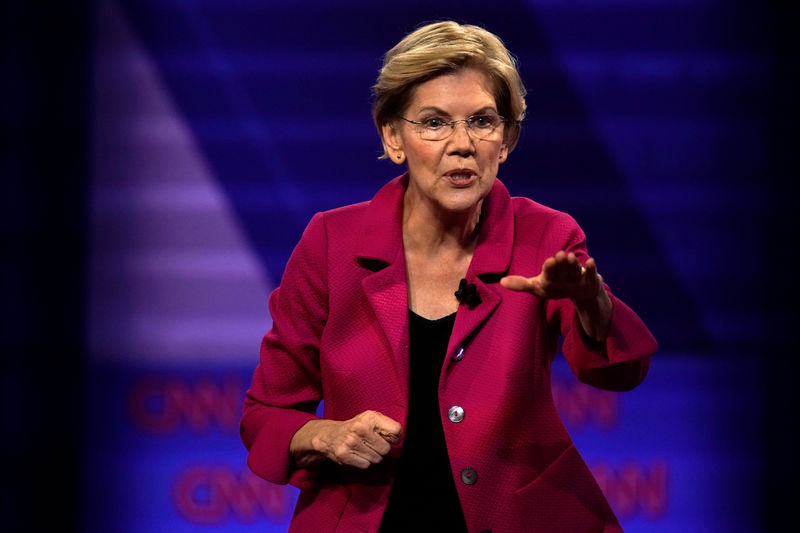By Amanda Becker
WASHINGTON (Reuters) - U.S. Democratic presidential hopeful Elizabeth Warren said on Tuesday she will not accept campaign contributions of more than $200 from executives at large tech companies, big banks, private equity firms or hedge funds, escalating her quest to eliminate the influence of moneyed interests on her campaign.
Warren, a U.S. senator from Massachusetts who has made anti-corruption efforts a focus of her White House bid, has called for a breakup of big tech companies and recently attacked Facebook's political advertising policies. She had already sworn off holding big-ticket fundraisers.
The White House hopeful had likewise pledged to not take money from federal lobbyists, rejected large contributions from executives at fossil fuel and big pharmaceutical companies and said she would not accept support from a type of well-funded political action committee known as a Super PAC.
In a move that could exacerbate fears among some Democrats that the party's eventual nominee will need to embrace such fundraising methods in order to take on Republican President Donald Trump in November 2020, Warren also said that she would adhere to her pledges in a general election.
"When I'm the Democratic nominee for president, I'm not going to change a thing in how I run my campaign: No PACs. No federal lobbyists. No special access or call time with rich donors or big dollar fundraisers to underwrite my campaign," Warren said in a statement provided by her campaign.
In a swipe at Trump, Warren also said she would ban administrations from using campaign contributions as a basis for selecting U.S. ambassadors, saying on Twitter that Trump had "perfected the act of selling swanky diplomatic posts to rich buffoons."
Warren acknowledged both Republican and Democratic presidents have given embassy jobs to donors.
Warren has steadily risen in national and early-state opinion polls and, in another sign her campaign is gaining steam, she raised about $25 million in this year's third quarter. That figure - up from $19.1 million raised between April and June - put her near the top of the Democratic field in fundraising but far behind Trump, whose campaign raised $125 million, along with the Republican National Committee, in the same period.
Warren called on the other 18 Democrats vying for the party's nomination to disclose any donor or fundraiser with a campaign title, and the dates, times and locations of campaign fundraisers, along with who hosted the event.
Warren's latest campaign pledges were made along with release of new components of a wide-ranging anti-corruption plan. Warren said she would make it illegal for corporate PACs to contribute, ban lobbyists from donating or fundraising, and strengthen limits on contributions that can be given to a single candidate.
The U.S. Supreme Court's 2010 Citizens United ruling struck down former limits on political contributions. Now, individuals or entities can give unlimited sums of money to Super PACs and other groups that can spend money to support or criticize candidates.
Former Vice President Joe Biden, whom Warren is trying to oust from his status as early frontrunner in the 2020 Democratic race, also released an ethics proposal this week that would ban private money from federal elections.
Biden has continued to host traditional, high-dollar fundraisers during his White House bid, but rejects contributions from lobbyists and support from a Super PAC.

The two will face off along with 10 other candidates during the next Democratic presidential debate in Ohio on Tuesday night.